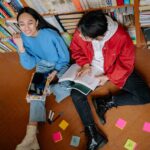It was a revelation when I first encountered the Theory of Knowledge and its Areas of Knowledge (AOKs). Here, in the heart of the International Baccalaureate program, lay a vibrant exploration of knowledge. Among these areas, the arts AOK always stood out as particularly intriguing. Understanding the role of the arts in TOK is a path to the heart of what it means to know and understand our world.
Understanding TOK Areas of Knowledge
From my extensive experience with the IB curriculum, I see AOKs as distinct lenses that offer varied and rich perspectives on our understanding of the world. Each Area of Knowledge, especially arts, provides a unique viewpoint, profoundly shaping our comprehension. Specifically, the arts AOK transcends the conventional boundaries of learning. It’s about a more holistic understanding. It includes emotions, creativity, and personal expression, often overlooked in more traditional disciplines.
Throughout my years of teaching and engaging with students, I’ve seen how the arts help individuals connect with information on a deeper, more intuitive level. The arts AOK in the Theory of Knowledge, whether via painting, music, or finely created writing, helps students experience and understand information in unique, subjective, universally meaningful ways.
This unique combination of emotional connection and intellectual inquiry distinguishes the arts as a crucial component of the TOK curriculum. The arts provide a forum for students to explore and express their ideas, resulting in a broader, more nuanced knowledge of the world around them.
The arts, therefore, are more than merely a complement to the TOK curriculum. They are an important, dynamic part of it. The arts encourage students to challenge the established quo, see beyond the apparent, and embrace the beauty and complexity of the human experience. They are a tremendous instrument for cultivating critical thinking, sensitivity, and a greater appreciation for the rich tapestry of human knowledge.
What Is Arts AOK in TOK?
This AOK challenges students to consider how knowledge is created, shared, and interpreted through various forms of artistic expression. Unlike more empirical areas of knowledge, the arts invite a subjective and deeply personal engagement with the world.
The arts AOK in TOK centers around the idea that artistic activities are a form of creative output and a means of understanding and interacting with the world. This understanding comes not from pursuing definitive answers but from exploring questions, emotions, and perspectives that art evokes.
Central to the arts AOK are several key aspects:
- Expression and Emotion. Art is a powerful vehicle for expressing emotions and experiences, offering insights into the human condition.
- Interpretation and Perception. Art requires and fosters a unique interpretative skill set, as individuals may perceive and interpret art differently based on their background, experiences, and beliefs.
- Cultural and Historical Contexts. Art often reflects the cultural and historical contexts in which it was created, providing a window into different eras and societies.
- Creativity and Innovation. The arts celebrate creativity and innovation, encouraging individuals to think beyond conventional boundaries.
- Communication and Connection. Art is a universal language communicating ideas and emotions across diverse cultures and times.
In TOK, analyzing and engaging with the arts allows students to develop a deeper appreciation for how knowledge is constructed and conveyed in ways that rely not solely on logical reasoning or empirical evidence. This AOK teaches students to appreciate the subjective nature of understanding and the importance of perspective in knowledge creation.
Artistic Expression and Knowledge Development
Artistic expression is a powerful tool for developing knowledge. Through it, we not only perceive the world but also interpret and give it meaning. In my observations, artworks – be it painting, music, or drama — often reveal insights into our culture, history, and personal identity.
I’ve seen that artworks, whether paintings, musical compositions, or theatrical performances, are not mere representations. Instead, they act as gateways to deeper understanding. They often reveal intricate insights into our culture, history, and personal identity, offering perspectives that might remain unnoticed in other areas of study.
According to general IB criteria, the analysis and creation of art encourage critical thinking and reflection, which is essential for a well-rounded education. For instance, when students engage with a piece of art, they’re not just observing colors on a canvas or listening to notes in a melody. They are interpreting a language that transcends words. In my experience, this process of interpretation is where true learning and understanding occur.
Moreover, in my view, artistic expression fosters empathy and global-mindedness. It allows students to connect with experiences and emotions that may be far removed from their own. Through art, we learn to appreciate diversity and to see the world through the eyes of others, which is a cornerstone of the IB philosophy.
As I understand it, art also serves as a historical record, offering insights into different eras and cultures. By studying art, students gain a deeper appreciation of historical contexts and the evolution of societal norms and values. It enriches their knowledge of history and enhances their understanding of contemporary issues.
Arts AOK in the Theory of Knowledge Essay
So, arts AOK challenges students to explore how knowledge is constructed and conveyed through creative mediums. Let’s consider its implications and significance in the TOK essay.
The Intersection of Creativity and Knowledge
In the Arts AOK, creativity isn’t just an act of producing art; it’s a vital way of knowing. This section researches how creativity influences our understanding and construction of knowledge, emphasizing its role in developing critical and innovative thinking skills.
Emotional Perception as a Way of Knowing
Here, we examine the role of emotions in interpreting art and how this affects our perception of knowledge. This segment highlights the importance of emotional responses in understanding artworks and how they contribute to a deeper, more personal form of knowledge acquisition.
The Impact of Cultural Context in the Arts
The arts are deeply rooted in cultural contexts. This part of the essay focuses on how different cultural backgrounds influence artistic expression and interpretation, underlining the significance of cultural context in shaping our understanding of art as a form of knowledge.
Arts and Other Areas of Knowledge
The essay concludes with a comparative analysis, placing the arts AOK alongside other TOK areas of knowledge. This part aims to illustrate the arts’ unique contributions to our overall understanding of knowledge and how they differ from more empirical or logic-based AOKs.
Implementing Arts AOK in the TOK Essay
By implementing these tactics, you can successfully use the arts AOK in a TOK essay structure to explore the complexity of knowledge acquisition and interpretation.
Identify Key Themes
Start by pinpointing the key themes in the arts that align with the essay question. Themes like interpretation, emotional expression, cultural context, and creativity are often central in the arts AOK. By focusing on these themes, you can align your essay with core aspects of the arts.
Use Art as an Example
Incorporate examples from various art forms — painting, music, literature, drama — to illustrate your points. For instance, discuss how a particular artwork or artist has influenced perception and knowledge in a specific cultural context. These examples serve as powerful tools to substantiate your arguments.
Explore the Subjective Nature of Art
The arts are inherently subjective, making them a rich ground for considering different perspectives. Discuss how the interpretation of art can vary based on personal, cultural, and historical contexts and how this affects our understanding of knowledge.
Compare and Contrast with Other AOKs
Highlight the distinct nature of the arts by comparing it with other Areas of Knowledge. For example, you might contrast the emotional and subjective aspects of the arts with the empirical and objective nature of the sciences.
Discuss Ways of Knowing in the Context of Arts
Dig into how various Ways of Knowing (WOKs), like emotion, reason, and imagination, play a role in the arts. Explore how these WOKs contribute to our understanding and appreciation of art and influence the knowledge we derive from it.

Need help with your IB TOK essay?
From research and analysis to structuring and editing, our skilled mentors will be by your side, helping you write an exceptional TOK essay that meets the word count and stringent IB criteria.
Reflect on Personal Experience
If relevant, include personal reflections or experiences with art to add depth to your work and meet the TOK essay word count. It can involve personal encounters with artworks or creative processes, illustrating how they have shaped your understanding of knowledge.
Address the Knowledge Questions
Relate your discussion to the central knowledge questions in TOK. How does the arts AOK help us to address these questions? What insights about knowledge and its acquisition does the arts AOK offer?
Conclusion
Many real life situations and examples have repeatedly demonstrated the arts’ significant influence in shaping our understanding of knowledge. As an IB educator, I’ve observed that studying various artworks, ranging from timeless classics to modern creations offers priceless insights into the diverse epochs, cultures, and philosophies across history.
Therefore, the arts hold a crucial place in the Theory of Knowledge. They provide a distinct perspective on our comprehension and interaction with the world. I always encourage students to engage with this fascinating AOK, allowing them to appreciate how the arts can challenge, inspire, and reshape our perception of knowledge.
Also, don’t forget that our team of IB experts is always available to help you with TOK essay writing if you need any assistance.
Luke MacQuoid
Luke MacQuoid has extensive experience teaching English as a foreign language in Japan, having worked with students of all ages for over 12 years. Currently, he is teaching at the tertiary level. Luke holds a BA from the University of Sussex and an MA in TESOL from Lancaster University, both located in England. As well to his work as an IB Examiner and Master Tutor, Luke also enjoys sharing his experiences and insights with others through writing articles for various websites, including extendedessaywriters.com blog
- The Impact of Personal Beliefs on Knowledge Interpretation in TOKby Luke MacQuoid
- The Psychology Behind Knowledge Acquisitionby Luke MacQuoid
- Debunking TOK Myths. Clarifying Common Misconceptionsby Luke MacQuoid
- The Future of the Theory of Knowledgeby Luke MacQuoid
- History of IB TOK Course: Who Invented IB TOK?by Luke MacQuoid
- Critical Thinking Skills in TOK Essay Writingby Luke MacQuoid





